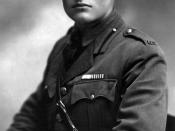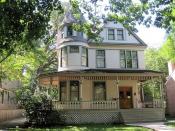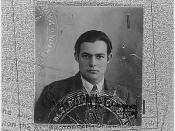In Search of Light and Finding Darkness In his short story "A Clean, Well-Lighted Place" Ernest Hemingway creates the stages of his life and portrays himself as the character of the older waiter viewing a customer, the old man, slipping away into the shadows, sheltered from the light of life. Hemingway was a creative but tormented artist and if the reader spends the time with an open mind it is easy to get into, and enjoy his stories. In order to fully understand Hemingway, if one can fully do so, you must know some background and history that influenced these special stories. Short stories are the most difficult to write as they must convey the point, set the stage, describe the characters, and in Hemingway's , case he put himself into his stories, adding to the complexities while still saying so much.
It is well known that the Hemingway family had a history of suicide as well as cases of severe depression.
Hemingway himself ended his own life at the age 69. He mentioned to his family that he felt he had lost his ability to write. He put himself into his characters and he was not living new adventures as he had in the past, nor reliving old ones; he was getting older. In this story he was looking at the past and, at the same time, what he felt was his future. The younger waiter projects the impatience of youth and disdain for older people who are slow and don't seem to have any excitement left in their lives. "An old man is a nasty thing, says the young waiter," he only cares that the old man pays his tab and leaves (200). The young waiter is anxious to leave, live his life and see what the light will bring. The older waiter understands the old man, that someday he will in fact be him, and understands there is no point in rushing. For him finally, daylight brings sleep. The older waiter says, "The old man is clean. He drinks without spilling." "I am of those who like to stay late at the café." He says "Each night I am reluctant to close up because there may be someone who needs the café."(200-201) As the old man leaves he walks unsteadily but with dignity. This is understood by the older waiter but not the younger one.
The soldier that passes through the scene at the beginning of the story was a glimpse of Hemingway in his young, adventure years, with no attachments, not settled down yet and before he had someone permanent to come home to. The soldier was a brief reference to his time in the wars in Europe. It is hard to tell but I believe the older waiter was speaking to the younger one playing the moralist when he said the soldier had better get off the street or the guard will pick him up. The younger waiter says "what does it matter if he gets what he's after?"(199). After all the younger waiter is still young and obviously does not always go directly home either. "And you? You have no fear of going home before the usual hour?" the older waiter asks. "No I have confidence. I am all confidence." replies the younger waiter (201). Hemingway is proposing that at his age he is not afraid to take risks such as being caught by his wife.
The older waiter is not yet an old man and replies "We are of two different kinds. He was not dressed to go home" (201). As you get older you realize youth and confidence is not the only thing it takes to get companionship. The older waiter is reluctant to close up, yet he does have concerns. When he turns out the light it is though it is Hemingway having a conversation with himself realizing the thing that was bothering him was not fear or dread but looking at the nothingness that he felt was his future old age. He recites both The Lords' Prayer and the Hail Mary substituting nada for the key words for it was the old mans' young niece that cut him down during his suicide attempt for "Fear for his Soul."(200). The older waiter, like the old man did not fear for his soul. This reference might be Hemingway acknowledging that, had the two older men had more religious conviction, it could be of some support. "For I am the light", said Christ. Hemingway was not a particularly religious person and it looks as though he wishes he had been.
Without too much difficulty one can see the transition Hemingway felt using these four characters. The older characters are enveloped in the darkness of their lives yet they are able to deal and cope only when tempered by some light. The old man does not deal with the light of reality it must be tempered by the, "shadow the leaves of the tree made against the electric light" for he is in the shadows of his life, and the older waiter can finally go to sleep when it is daybreak (199).
For all of us there are significant stages of our lives when we look at our selves. How we lived our lives, where we are and where we are going. This is particularly evident her where the main characters are having a discussion regarding one of the central themes.
"Last week he tried to commit suicide." one waiter said. "Why?" "He was in despair." "What about?" "Nothing." "How do you know it was nothing?" "He has plenty of money." (199) This was a period of Hemingways' life where he was struggling with where he had been and what his future would be. The characters dealt in a moving way to represent this struggle which was Hemingways life. Certainly Hemingway had plenty of money but he did despair. If one knows Hemingway life and his works of literature it is easy to see how he portrays himself through these characters.





